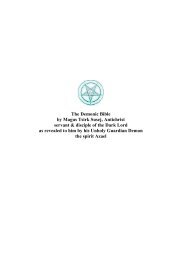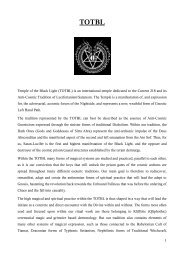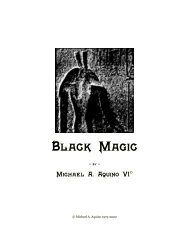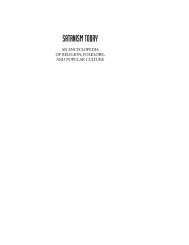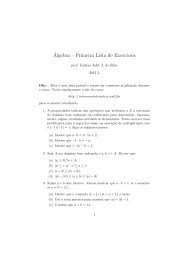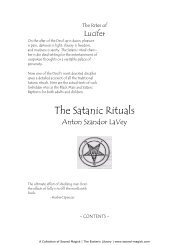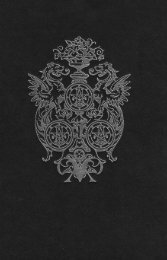I. VAMA MARGA Foundations Of The Left-Hand Path - staticfly.net
I. VAMA MARGA Foundations Of The Left-Hand Path - staticfly.net
I. VAMA MARGA Foundations Of The Left-Hand Path - staticfly.net
Create successful ePaper yourself
Turn your PDF publications into a flip-book with our unique Google optimized e-Paper software.
implies at least some element of control, either through guidance or<br />
manipulation. It implies, that is, a technique whereby reality is encouraged,<br />
persuaded, induced or coerced to conform to certain specific objectives.<br />
Magic, in short, is the process of exploiting the malleability of reality, and of<br />
shaping it – or alchemically transmuting it – in accordance with given<br />
purposes or goals."<br />
Much as with any consideration of the objective value of artistic creation,<br />
what one magician considers an experience of infinite profundity may seem<br />
entirely worthless or even ridiculous to another magician. For this reason,<br />
among many others, magic is a discipline ill-suited for those who require<br />
hard and fast rules and absolutely verifiable results.<br />
Although we use the word magician in this text to facilitate ease of<br />
communication, it should be noted that those operating outside of a Western<br />
classical cultural framework are not limited to this word to describe<br />
themselves. <strong>The</strong> Sanskrit word siddha is commonly used in India to describe<br />
those who practice magic, and is certainly appropriate to the left-hand path,<br />
considering its sub-continental roots. Related to this word through their<br />
common Indo-European language stream is the Nordic practitioner of seithr,<br />
a left-hand path sex magic of Northern Europe, a Hyperborean shamanism.<br />
From Siberia comes the word shaman, the master of ecstasy whose magic is<br />
achieved while in a state of trance. A multiplicity of other ways to describe<br />
151<br />
the magician can be discovered in the esoteric traditions of the world; a<br />
surprising amount of power can be awakened by locating exactly the right<br />
designation for your practice.<br />
Magic Black And White<br />
A word already fraught with ambiguity and open to interpretation becomes<br />
even mistier when painted a specific color. <strong>The</strong>re are those who insist on<br />
designating this form of magic as "black" and that form as "white." In our<br />
view, this color-coding does nothing but perpetuate very limited and<br />
arbitrary cultural and religious prejudices at the expense of clarity. At its<br />
most simplistic and ignorant level, the black magic/white magic appellation<br />
is connected to the equally primitive good/evil dichotomy. Since we<br />
attribute no objective meaning whatsoever to the terms "good" and "evil", it<br />
only follows that we must reject the popular consideration of black magic as<br />
magic performed in the service of Evil and white magic as magic that<br />
perpetuates the Good. Ancient Greek magi, despite their relative lack of<br />
moral judgment, described practices intended to harm, bind or hypnotize as<br />
kakotechnia, "the evil art". This concept can he compared to the common<br />
Indian description of Tantric left-hand path magic – especially the<br />
previously described six malevolent rites – as Abichara.<br />
Historically, the phrase black magic seems to have been devised by<br />
the alchemist Albertus Magnus, the thirteenth century mage who proposed<br />
that black magic was the "demonic" opposite of a benevolent natural magic,<br />
which he attributed to heavenly angelic powers. <strong>The</strong> twentieth century mage<br />
Gurdjieff, often denigrated as a black magician by his detractors, proposed a<br />
typically idiosyncratic definition of black magic, describing it as "a<br />
falsification, an imitation of the outward appearance of 'doing'." For those<br />
magicians whose identity formation demands a simple, easily grasped label,<br />
the roles of black magician and white magician are attractive categorizations<br />
requiring a bare minimum of thought to adopt. Self-described black<br />
magicians, enamoured of popular conceptions of the allure of evil, and<br />
usually motivated by a need to prove their social defiance, can step into an<br />
instant one-size-fits-all subcultural role satisfying the need for easy rebellion.<br />
At the other extreme, the self-described white magician, who is often<br />
compelled to prove his or her social acceptability, can pat themselves heartily<br />
on their hacks for becoming such benevolent beings. Both tactics reduce the<br />
complex multiverse of magical operations to a cartoon level. If such




